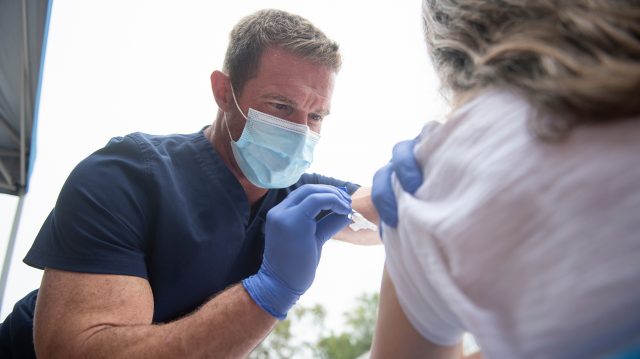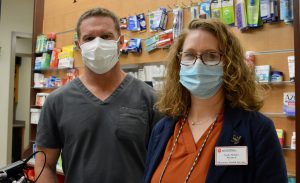
Chad Westmoreland, staff pharmacist at the University Health Center and an instructor in pharmacy practice, gives a flu shot on the Galtney Plaza as part of this fall’s Operation Immunization. Photo by Logan Kirkland/Ole Miss Digital Imaging Services
OXFORD, Miss. – When COVID-19 became a public health crisis, college campuses across the country shut down. At the University of Mississippi, students didn’t return after an extended spring break, while faculty and staff began working from home.
During that time, as well as the return to campus this summer, Ole Miss was fortunate for the exceptional team of health care providers at the University Health Center, including Pharmacy Health Services’ Sandy Bentley and Chad Westmoreland.
“Pharmacists are very adaptable, and we are willing to do what needs to be done for our patients,” said Bentley, director of the health center’s pharmacy and clinical assistant professor of pharmacy practice at the School of Pharmacy. “I’m proud to hear the stories of our colleges going above and beyond for our communities.
“I’m looking forward to getting this pandemic under control, and enjoy that we are returning to somewhat normal operations.”
Those operations changed quickly in March 2020. The pharmacy worked with one pharmacist inside the V.B. Harrison Health Center and moved to curbside service to limit in-person contact.
As Bentley noted, students are the main reason for their work on campus, and the pharmacy would have to find ways to accommodate those who couldn’t return home, had no vehicle or had to quarantine. Bentley and Westmoreland found ways to help, delivering to residence halls even for things as simple as Tylenol or ibuprofen.

University Health Center pharmacists Chad Westmoreland (left) and Sandy Bentley work to provide patients with reliable information regarding their health, as well as vital medications. Photo by Whitney Tarpy/School of Pharmacy
Campus is back to full operations, and so is the Pharmacy Health Services team.
“Since the entire pharmacy team is vaccinated, we are able to work in the pharmacy together without the worry of infecting each other,” Bentley said. “We still wear masks but no longer require face shields to do our work.
“We are also providing the vaccine to our community and information to those with questions about the vaccine.”
Westmoreland, staff pharmacist and instructor in pharmacy practice, said most of the concerns and hesitations he has encountered are about the safety and effectiveness of each vaccine and the misinformation surrounding them.
“We felt our job was to reassure patients that these were thoroughly studied vaccines and were proven to be safe as well as effective,” Westmoreland said. “Although the perception was that the approval of the vaccine happened very quickly, that this was technology that has been studied for many years.”
For pharmacists everywhere, the pandemic and other growing health concerns serve as a reminder that the profession must always be working to find new and creative ways to serve patients.
“One of the biggest lessons I have learned from the pandemic is that the pharmacist can serve as a reliable source of information, and to always be prepared to provide accurate information,” Westmoreland said. “We are usually an easier resource for people than finding the time to see a physician.
“We must remain knowledgeable and stay up to date on the science so that we can be that trusted source of information.”